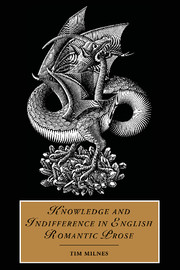Book contents
- Frontmatter
- Contents
- Acknowledgements
- Introduction: Romanticism's knowing ways
- 1 From artistic to epistemic creation: the eighteenth century
- 2 The charm of logic: Wordsworth's prose
- 3 The dry romance: Hazlitt's immanent idealism
- 4 Coleridge and the new foundationalism
- 5 The end of knowledge: Coleridge and theosophy
- Conclusion: life without knowledge
- Notes
- Bibliography
- Index
- CAMBRIDGE STUDIES IN ROMANTICISM
1 - From artistic to epistemic creation: the eighteenth century
Published online by Cambridge University Press: 22 September 2009
- Frontmatter
- Contents
- Acknowledgements
- Introduction: Romanticism's knowing ways
- 1 From artistic to epistemic creation: the eighteenth century
- 2 The charm of logic: Wordsworth's prose
- 3 The dry romance: Hazlitt's immanent idealism
- 4 Coleridge and the new foundationalism
- 5 The end of knowledge: Coleridge and theosophy
- Conclusion: life without knowledge
- Notes
- Bibliography
- Index
- CAMBRIDGE STUDIES IN ROMANTICISM
Summary
If we take in our hand any volume; of divinity or school metaphysics, for instance; let us ask, Does it contain any abstract reasoning concerning quantity or number? No. Does it contain any experimental reasoning concerning matter of fact and existence? No. Commit it then to the flames: for it can contain nothing but sophistry and illusion.
David Hume, An Enquiry Concerning Human UnderstandingThe roots of Romantic discourse in eighteenth-century philosophy and psychology have been charted extensively elsewhere, to the extent that this provenance is now generally accepted in English literary history. My present claim that there is a divergence between certain tendencies in Wordsworth and Hazlitt – some impelling these writers towards a new, radical theory of creation; others drawing them back to an empirical, foundationalist conception of ‘knowledge’ – is quite compatible with this. Again, I wish neither to essentialize ‘Romanticism’, nor oppose it in some binary way to a preceding tradition. Yet an appreciation of inheritance and continuity in literary theory at the turn of the century should remain alert to ripples in the current, or sudden shifts in the river-bed; in other words, of simultaneous, more dramatic change. It should not elide the possibility that incompatible premises and assumptions, knitted together for a time by consensus and habit, should finally, through changing literary and social conditions, prove impossible to reconcile, and that as a result, certain theoretical problems which had hitherto merely been a source of difficulty may suddenly become unbearable.
- Type
- Chapter
- Information
- Knowledge and Indifference in English Romantic Prose , pp. 25 - 70Publisher: Cambridge University PressPrint publication year: 2003

